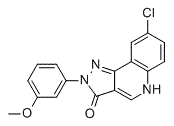Acute coronary syndromes are conditions that result from an acute reduction in perfusion of part of the coronary circulation, including unstable angina and non-ST- and ST-elevation myocardial infarction. Genetic markers offer the promise of identifying individual patients at increased risks of early diseaseonset, or worse prognosis, and who may benefit from additional screening and early Coptisine-chloride intervention. Genetic polymorphisms have been associated with increased risk for ACS, but the  number of reports investigating genetic association with clinical outcome following specific ACS events is comparatively few. Although rs6922269 has been associated with risk of developing CAD in several GWAS, genetic association studies of rs6922269 with clinical outcome in patients with established CAD are limited. We hypothesized that rs6922269 would be associated with mortality after hospital admission for ACS, and investigated its association with baseline characteristics, natriuretic peptides, other clinical risk factors and survival in a cohort of 1940 patients recruited after hospital admission for ACS and followed for over 4 years. We then sought validation of our findings in an independent cohort of 842 post-MI patients followed for 8.8 years. To investigate association with Ursolic-acid relevant metabolic risk factors we hypothesized that homocysteine and active vitamin B12 plasma levels would be perturbed in patients with the high-risk genotype of rs6922269, reflecting the role of MTHFD1L in folate metabolism. Availability of suitable plasma samples limited these folate pathway metabolite assays to a subset of the CDCS cohort. Mortality in patients with the AA genotype for rs6922269 was significantly greater than patients with GA or GG genotype in the CDCS cohort, limited to those patients with above median NTproBNP levels at baseline, suggesting rs6922269 genotype may be useful in further risk stratification of these patients, already with a poor prognosis. Possibly only those with high NT-proBNP express the additional genetic risk of AA genotype, potentially mediated through vitamin B12 levels. Patients with an AA genotype had higher plasma creatinine levels and lower active vitamin B12 levels at baseline, indicating poorer kidney function and higher CVD risk. Inclusion of rs6922269 genotype in a Cox proportional hazards model including established predictors of mortality from similar cohorts, demonstrated genotype was an independent predictor of mortality. The prognostic value of the rs6922269 genotype for mortality was not strongly replicated in the PMI cohort. While a hint of an allele-A dominant association with PMI cohort mortality prior to 6 years of follow-up was detected, this was much weaker than the association with mortality observed in the CDCS cohort. While the functional effect of rs6922269 is currently unknown, a possible mechanism through which MTHFD1L polymorphisms may affect CHD risk, and potentially clinical outcomes, is by influencing folate pathway metabolite levels. When adjusted for age and hypertensive status a significant association between active vitamin B12 levels and rs6922269 genotype is revealed.
number of reports investigating genetic association with clinical outcome following specific ACS events is comparatively few. Although rs6922269 has been associated with risk of developing CAD in several GWAS, genetic association studies of rs6922269 with clinical outcome in patients with established CAD are limited. We hypothesized that rs6922269 would be associated with mortality after hospital admission for ACS, and investigated its association with baseline characteristics, natriuretic peptides, other clinical risk factors and survival in a cohort of 1940 patients recruited after hospital admission for ACS and followed for over 4 years. We then sought validation of our findings in an independent cohort of 842 post-MI patients followed for 8.8 years. To investigate association with Ursolic-acid relevant metabolic risk factors we hypothesized that homocysteine and active vitamin B12 plasma levels would be perturbed in patients with the high-risk genotype of rs6922269, reflecting the role of MTHFD1L in folate metabolism. Availability of suitable plasma samples limited these folate pathway metabolite assays to a subset of the CDCS cohort. Mortality in patients with the AA genotype for rs6922269 was significantly greater than patients with GA or GG genotype in the CDCS cohort, limited to those patients with above median NTproBNP levels at baseline, suggesting rs6922269 genotype may be useful in further risk stratification of these patients, already with a poor prognosis. Possibly only those with high NT-proBNP express the additional genetic risk of AA genotype, potentially mediated through vitamin B12 levels. Patients with an AA genotype had higher plasma creatinine levels and lower active vitamin B12 levels at baseline, indicating poorer kidney function and higher CVD risk. Inclusion of rs6922269 genotype in a Cox proportional hazards model including established predictors of mortality from similar cohorts, demonstrated genotype was an independent predictor of mortality. The prognostic value of the rs6922269 genotype for mortality was not strongly replicated in the PMI cohort. While a hint of an allele-A dominant association with PMI cohort mortality prior to 6 years of follow-up was detected, this was much weaker than the association with mortality observed in the CDCS cohort. While the functional effect of rs6922269 is currently unknown, a possible mechanism through which MTHFD1L polymorphisms may affect CHD risk, and potentially clinical outcomes, is by influencing folate pathway metabolite levels. When adjusted for age and hypertensive status a significant association between active vitamin B12 levels and rs6922269 genotype is revealed.
In clinical aspect of NSCLC subtypes and have implications for their imaging profiling and monitor the treatment response
Leave a reply